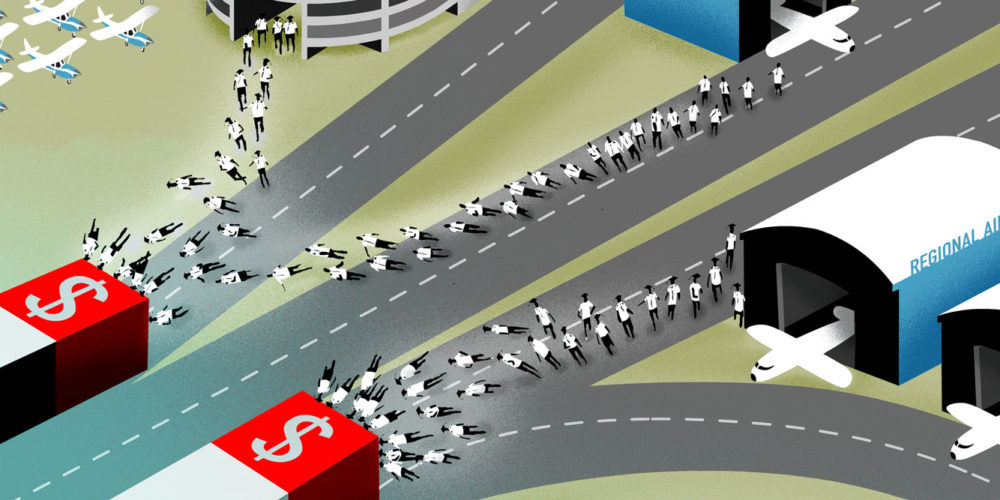From the Editor
We asked and you answered. According to early results of our Web Exclusive Pilot Shortage Survey [spring 2017], Lift readers agree that the No. 1 factor contributing to a deficit of qualified airline pilots is low starting pay (37 percent). Additionally, 60 percent of respondents believe the pilot shortage may ultimately impact safety for air travelers. Check out the final survey results at lift.erau.edu/shortage-survey.
Our feature on the pilot shortage sparked a healthy debate. We received a number of emails and online comments. And, the spring Lift, Off the Page livestream event on the topic garnered record attendance. Watch it here: lift.erau.edu/videos-spring-2017.
Thanks for joining the discussion. We’ve included some of your comments below.
— Sara Withrow, Editor
Opinions Vary on Pilot Shortage
A Multi-Factor Problem
The pilot shortage is related to many factors, including salary, education expenses and seniority issues, which is why many pilots work in other careers. In my case, I have worked for a flight-training department for the last 30 years, where I make more money, considering benefits and other factors, rather than flying for any commuter. I have 1,213 flight hours and multiple ratings and certificates. I also hold a Federal Aviation Administration Airframe and Powerplant certificate, and I am certified as an avionics technician. It would be very difficult for me to take a pay cut for what the industry has to offer.
Harold E. Calderon (’10, WW)
B.S. Professional Aeronautics
Pilot Salaries Need to Triple
There is no pilot shortage. PERIOD. There is, however, a major pay shortage in the airline industry for pilots. Take a quick look at the cost of going through ERAU, and then land a $60K job which in 10-15 years may or may not lead to a $200K-plus job. Then compare that to a doctor, a CEO, a lawyer or even a truck driver. One will quickly see that the pilot salaries need to triple to compete with any one of them.
Kim Swang (’97, DB)
B.S. Professional Aeronautics
Skilled Pilots in Short Supply
In the world of 135 operators, both cargo and passenger, we are definitely seeing a shortage of “skilled” pilots. Those 135 operators absolutely have a smaller pool of people to select from, and we are starting to see the bottom scraped out of that pool.
Chris Rockhold (’94, PC)
B.S. Aeronautical Science
Correction Needed
There is a mistake in the spring 2017 issue [print edition]. On page 23 [Giving To: A Family Legacy] it states that Marquita Fortner Pfannenstiel (’04, PC) is the first legacy alumnus (child of an alumnus) of the Prescott Campus. While it is wonderful to read about a student attending the same college as their parent, the first legacy alumnus of the Prescott Campus graduated in 1996, not 2004.
My mother, J.J. Kloss (now Gagne), a single mother with three young daughters, proudly graduated from the Prescott Campus in 1984. I remember being on campus during her school years, and I knew ERAU was my future.
I graduated from the Prescott Campus in 1996, with two bachelor’s degrees, exactly 12 years after my mother graduated. On my graduation day, I was given special recognition: 1) for being a dual-degree graduate, and 2) for being the first child of an alumnus to graduate, mother and daughter.
There is pride in knowing that I followed my mother and my dreams. There is pride in knowing that the campus recognized my hard work and that women who graduated after me had a role model. Marquita no doubt has that same pride in following her father and her dreams; and Embry-Riddle has the honor to appreciate the impact it has on future generations.
Matt (Kloss) Miglin (’96, PC; ’00, WW)
B.S. Aerospace Engineering
B.S. Aeronautical Science
Master of Aeronautical Science
EDITOR’S NOTE: Please forgive the oversight, Matt. Our database did not indicate a relationship existed between you and your mother. We’ve corrected this error in the database and corrected the article in the online edition of Lift. Thanks for setting the record straight!
